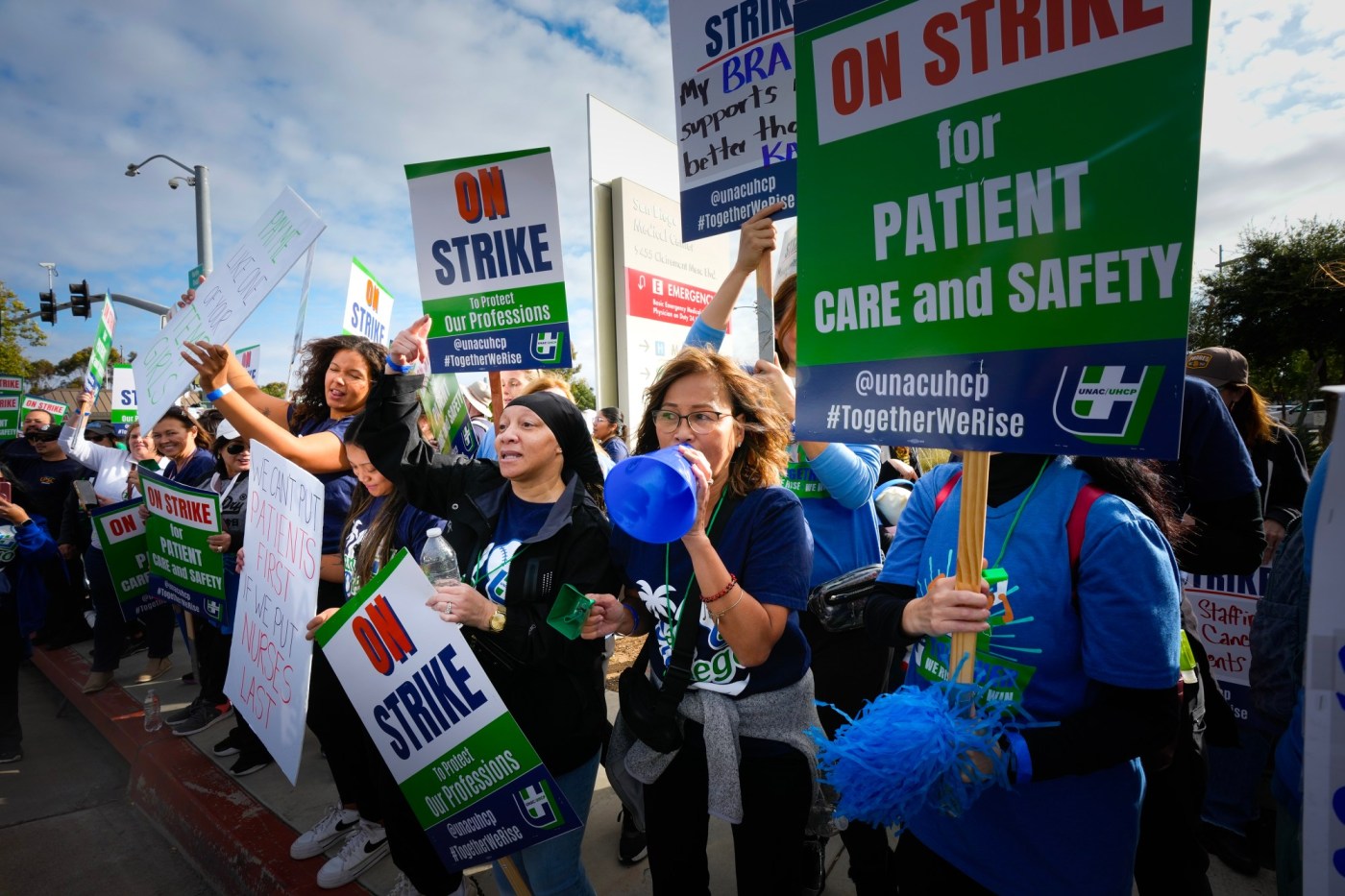Politics
Kaiser Health Care Workers Launch Five-Day Strike for Better Conditions

Health care workers at Kaiser Permanente commenced a five-day strike on March 5, 2024, as they demand improved contract negotiations. The strike began early Tuesday morning, with workers gathering in front of the Kaiser San Diego Medical Center in Kearny Mesa, California. Similar demonstrations occurred at Kaiser facilities across California, as well as in Hawaii and Oregon, highlighting a unified push for better working conditions.
The strike has forced Kaiser to hire replacement workers and reschedule numerous non-emergency appointments. While the organization has not disclosed the exact number of appointments affected, it did notify over 600,000 members in San Diego County and approximately 9.5 million members across California that it “may need to reschedule some nonurgent appointments, surgeries, and procedures” during the protest. Despite the strike, emergency departments remain operational, although an estimated 31,000 nurses and other caregivers have joined the action.
Workers Demand More Than Just Pay
The messages conveyed by striking workers emphasize concerns related to patient care and safety. They also highlight the broader issues of staffing levels and work-life balance. Registered emergency department nurse Sal Silva articulated the challenges faced by health care professionals, stating, “I have to work 16-hour shifts like three or four days a week. I don’t want to be here that many hours.” Silva expressed that the current working conditions have detrimental effects on family life.
Registered nurse Sandy Early, who works in the intensive care unit at the same facility, recently experienced a neck injury that she attributes to inadequate staffing. Early explained, “People are getting hurt because there’s not enough bodies in there. This is not just about money. I’m a patient and a Kaiser member, too.” She emphasized that delays in receiving care are a direct result of the staffing shortages, making it difficult for patients to schedule appointments.
Kaiser has stated that it has offered pay increases of 21.5% over the next four years to striking workers, while union representatives are pushing for a 25% increase. The health care provider has indicated that wage concerns are a significant factor in the strike, but workers are equally focused on improving overall working conditions.
Upcoming Demonstrations and Solidarity Actions
The protests are not limited to Kaiser workers. From March 6 to March 8, employees at Sharp HealthCare, represented by the same coalition of unions, will demonstrate in solidarity, although they will not walk off their jobs. This action is expected to take place on their own time, meaning that patient appointments should remain unaffected.
The ongoing strike at Kaiser Permanente reflects broader issues within the health care system, where demands for fair pay and adequate staffing continue to resonate among workers. As the situation develops, the focus remains on finding a resolution that addresses the concerns of health care professionals and ensures quality patient care.
-

 Lifestyle3 months ago
Lifestyle3 months agoLibraries Challenge Rising E-Book Costs Amid Growing Demand
-

 Sports3 months ago
Sports3 months agoTyreek Hill Responds to Tua Tagovailoa’s Comments on Team Dynamics
-

 Sports3 months ago
Sports3 months agoLiverpool Secures Agreement to Sign Young Striker Will Wright
-

 Lifestyle3 months ago
Lifestyle3 months agoSave Your Split Tomatoes: Expert Tips for Gardeners
-

 Lifestyle3 months ago
Lifestyle3 months agoPrincess Beatrice’s Daughter Athena Joins Siblings at London Parade
-

 World2 months ago
World2 months agoWinter Storms Lash New South Wales with Snow, Flood Risks
-

 Science3 months ago
Science3 months agoTrump Administration Moves to Repeal Key Climate Regulation
-

 Business3 months ago
Business3 months agoSoFi Technologies Shares Slip 2% Following Insider Stock Sale
-

 Science3 months ago
Science3 months agoNew Tool Reveals Link Between Horse Coat Condition and Parasites
-

 Science2 months ago
Science2 months agoSan Francisco Hosts Unique Contest to Identify “Performative Males”
-

 Sports3 months ago
Sports3 months agoElon Musk Sculpture Travels From Utah to Yosemite National Park
-

 Science3 months ago
Science3 months agoNew Study Confirms Humans Transported Stonehenge Bluestones









